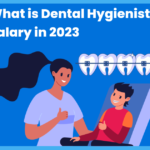Are you thinking about enrolling in Dental Hygienist School? Here is some important information that prospective students should consider.
If you’re considering a career in dental hygiene, enrolling in a Dental Hygienist School is the first step.
Dental hygienists play an integral role in maintaining patients’ oral health by working closely with dentists to provide preventative care, cleanings, and education.
But before enrolling, it’s essential to understand what to expect and how to choose the best program for you.
This article will cover everything you need to know about Dental Hygienist School, including introductory classes, salary expectations, and certification processes.
- What to Expect From a Dental Hygienist School
- Discover the Essential Classes Needed for a Dental Hygienist Degree
- Preventive Care and Patient Education
- How Much Do Dental Hygienists Earn?
- Apply Now for Dental Hygienist Jobs!
- Requirements for Dental Hygienist Liability
- How to Become a Certified Dental Hygienist
- Periodontics: A Specialty Field of Dental Hygiene
- The Advantages of Continuing Education for Dental Hygienists
- Conclusion
What to Expect From a Dental Hygienist School
Before enrolling in a Dental Hygienist School, it’s essential to know what to expect. Programs range in length from two to four years, depending on the degree you wish to earn, and typically involve both coursework and clinical practice with actual patients for hands-on experience.
Some topics you can expect to learn during this time include:
- Anatomy and Physiology of the Head and Neck
- Oral Pathology
- Dental radiography
- Patient assessment and diagnosis
- Preventative care and patient education
- Pharmacology for dental hygienists
- Clinical dental hygiene practice.
How to Select the Ideal Dental Hygienist ProgramuiescVous souhaitez connaitre le meilleur programme de dental hygiene au canada?
Selecting the ideal dental hygienist program is essential to your success as a practitioner. When assessing programs, there are several elements to take into account such as:
Accreditation: Look for programs accredited by the Commission on Dental Accreditation (CODA). Accredited programs must meet stringent criteria about curriculum, faculty, and facilities.
Location: Consider the program’s location and whether it is convenient for you to attend. Also, ensure the program provides clinical practice opportunities in realistic dental settings.
Cost: Dental hygiene programs can be costly, so be sure to factor in tuition, fees, and materials. Be sure to explore financial aid options like scholarships, grants, and loans.
Program Length: Consider the length of the program and whether you can finish it within your desired timeline.
Discover the Essential Classes Needed for a Dental Hygienist Degree
To become a dental hygienist, you’ll need to complete several courses in addition to clinical practice. Important classes that you should expect to take include:
Anatomy and Physiology
Being familiar with the anatomy and physiology of the head and neck is essential for dental hygienists.
You’ll gain insight into the structure and function of teeth, gums, and oral cavity, as well as bones, muscles, and nerves that support them.
Oral Pathology
In oral pathology classes, you’ll learn about various diseases and conditions that can affect the oral cavity, such as gum disease, cavities, and oral cancer.
You’ll gain skills in recognizing these issues and creating treatment plans to address them effectively.
Dental Radiography
Dental radiography is the practice of taking X-rays of teeth and oral cavity. In this class, you’ll learn how to operate X-ray equipment and interpret radiographs to detect issues like cavities, gum disease, and bone loss.
Preventive Care and Patient Education
Education and prevention for patients are the basis of good dental hygiene.
In this course you’ll be taught the importance of maintaining good oral hygiene, including flossing, brushing and diet. In addition, you will learn how to inform patients about the best practices and offer preventative services, such as cleaning and fluoride treatments.
How Much Do Dental Hygienists Earn?
One of the most critical factors when selecting a career is salary. According to BLS data, as of May 2020, dental hygienists in America earned an average yearly wage of $77,090.
However, this figure can vary based on location, experience level, and employer type.
For instance, those working in metropolitan areas tend to earn higher wages than their counterparts living in rural areas; additionally, those with advanced degrees or certifications tend to make more than those without.
Apply Now for Dental Hygienist Jobs!
The future looks bright for dental hygienists. Data from the Bureau of Labor Statistics (BLS) suggests that the demand for dental hygienists is on the rise.
In fact, their employment is expected to see a 6 percent annual growth from 2019 to 2029, outpacing the average growth rate for most other professions.
A significant driver behind this surge is the older generation, who are increasingly seeking dental services as they age.
If you’re contemplating a career move in this direction, it’s essential to make a strong first impression.
Craft a resume and cover letter that effectively highlight your skills and past experiences in the field.
Moreover, be prepared to offer credible professional references when asked.
Some employers might also require you to undergo pre-employment assessments, so be ready to tackle those as well.
With the right preparation, you can position yourself as a top candidate in this growing field.
Requirements for Dental Hygienist Liability
Before becoming a dental hygienist, you must meet specific qualifications. The first step is completing an accredited dental hygiene program accredited by the Commission on Dental Accreditation (CODA).
These programs typically take two or three years and include classroom instruction and hands-on experience. You’ll learn about oral anatomy and physiology, proper oral hygiene techniques, and how to use dental tools and equipment correctly.
After graduating from your dental hygiene program, you must pass the National Board Dental Hygiene Examination (NBDHE) and the clinical exam.
Furthermore, you’ll need to obtain a license from your state’s dental board; requirements vary by jurisdiction but generally involve passing both a written exam and clinical assessment.
How to Become a Certified Dental Hygienist
Are you interested in becoming a certified dental hygienist? There are plenty of resources available to assist you on the journey.
To become a certified dental hygienist, you must pass the NBDHE and clinical exam administered by the American Dental Association’s Joint Commission on National Dental Examinations (JCNDE).
Certification isn’t necessary to practice dental hygiene but can enhance your job prospects and earning potential. You must complete continuing education courses every two years to maintain your certification status.
Guide to Dental Hygiene Specialties
As a dental hygienist, you have the unique opportunity to specialize in dental hygiene. Popular specialties include:
- Public health dental hygiene
- Education and research
- Clinical practice management
- Periodontics
- Pediatric Dentistry
- Geriatric Dentistry
Periodontics: A Specialty Field of Dental Hygiene
Periodontics is a dental hygiene specialty specializing in the prevention, diagnosis, and treatment of gum disease.
As a periodontist, you’ll collaborate with periodontists to provide non-surgical and surgical treatments for gum disease and educate patients on maintaining healthy gums and avoiding developing them in the first place.
Pediatric Dentistry for Dental Hygienists
Pediatric dentistry is a sought-after specialty for dental hygienists. As a pediatric dental hygienist, you’ll collaborate with children to teach them good oral hygiene habits and help them keep their teeth and gums healthy.
You may also provide preventive treatments like fluoride varnish or sealants.
The Advantages of Continuing Education for Dental Hygienists
Continuing education is integral to maintaining your dental hygienist license and certification. It keeps you current on the newest techniques, tools, and research in dental hygiene.
Continuing education courses may improve job prospects and earning potential.
Conclusion
Dental hygiene is an exciting and in-demand career that requires dedication to education and continuous learning.
By completing a CODA-accredited program, passing the necessary exams, and gaining licensure as a certified dental hygienist, you can become certified and make a positive difference in patients’ oral health.
With various specialties available and ample continuing education opportunities, this field offers plenty of potential for those interested.
Thanks For Reading Dental Hygienist School Topic Blog Till Here


